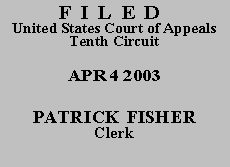

| CARMEL MCKINNEY,
Plaintiff-Appellant, v. JO ANNE B. BARNHART, Commissioner, Social Security Administration, Defendant-Appellee. |
|
Plaintiff Carmel McKinney appeals from an order of the district court affirming the Commissioner's determination that she is not entitled to Social Security disability benefits. We affirm.
We review the Commissioner's decision to determine whether her factual findings were supported by substantial evidence in light of the entire record and to determine whether she applied the correct legal standards. See Castellano v. Sec'y of Health & Human Servs., 26 F.3d 1027, 1028 (10th Cir. 1994). "Substantial evidence is such relevant evidence as a reasonable mind might accept as adequate to support a conclusion." Id. (quotations omitted). In the course of our review, we may "neither reweigh the evidence nor substitute our judgment for that of the agency." Casias v. Sec'y of Health & Human Servs., 933 F.2d 799, 800 (10th Cir. 1991).
Ms. McKinney alleged disability as of June 1, 1995(1) due to headaches, visual impairment, partial paralysis, fatigue and memory problems caused by a brain tumor and depression. The administrative law judge (ALJ) determined that Ms. McKinney was not disabled at step two of the five-step sequential process. See Williams v. Bowen, 844 F.2d 748, 750-52 (10th Cir. 1988).
On appeal, Ms. McKinney argues the ALJ erred in determining the onset date of her disability, and improperly evaluated her depression and pain. She maintains the ALJ's step two finding was not supported by substantial evidence.
Because the ALJ and the magistrate judge thoroughly and accurately reviewed the evidence, we need not repeat their summaries and conclusions here. We therefore affirm for substantially the reasons stated by the magistrate judge with the following brief comments.
Ms. McKinney is attempting to overcome the fact that there are no medical records supporting her claim that she was disabled prior to the expiration of her insured status. She proposes that because her brain tumor was diagnosed approximately six months after the expiration of her insured status, she had the tumor prior to that date. This is most likely correct. In fact, the medical examiner testified that "it's possible that the symptomatology may have started about six months before the angioma was detected." Aplt. App. at 49. The record shows that in September 1998, Ms. McKinney related a "nine month onset of vision changes with a recent increase in her headaches over the past year." Id. at 159.
None of the medical reports, however, show that Ms. McKinney was actually disabled prior to the expiration of her insured status. "[T]he relevant analysis is whether the claimant was actually disabled prior to the expiration of her insured status. A retrospective diagnosis without evidence of actual disability is insufficient. This is especially true where the disease is progressive." Potter v. Sec'y of Health & Human Servs., 905 F.2d 1346, 1348-49 (10th Cir. 1990) (citation omitted).
Counsel's attempt to prove disability through the use of medical articles is likewise unavailing. The determination of disability rests on medical opinions. Medical opinions are "statements from . . . acceptable medical sources that reflect judgments about the nature and severity of your impairment(s), including your symptoms, diagnosis and prognosis, what you can still do despite impairment(s), and your physical or mental restrictions." 20 C.F.R. § 404.1527(a)(2). Acceptable medical sources are defined at § 404.1513(a). Medical journal articles are not included as acceptable medical sources. We cannot give persuasive authority to an attorney's extrapolation of a medical article to his client's condition. See, generally, Soc. Sec. Rul. 96-5p, 1996 WL 374183, at *4 (clarifying that medical source statements must be submitted by acceptable medical sources and are to be based on the medical sources' personal knowledge of the claimant). While medical literature can be cited and relied on to support a claimant's position, it cannot be the only evidence showing disability.
The judgment of the United States District Court for the Northern District of Oklahoma is AFFIRMED for substantially the reasons stated in the magistrate judge's order of April 30, 2002.
Entered for the Court
Circuit Judge
*. This order and judgment is not binding precedent, except under the doctrines of law of the case, res judicata, and collateral estoppel. The court generally disfavors the citation of orders and judgments; nevertheless, an order and judgment may be cited under the terms and conditions of 10th Cir. R. 36.3.
1. Ms. McKinney's insured status expired March 31, 1997. Therefore, the relevant time period for determining her disability status is from June 1, 1995, the date she claimed she became unable to work, to March 31, 1997. See Adams v. Chater, 93 F.3d 712, 714 (10th Cir. 1996).